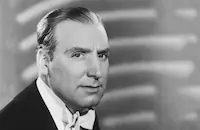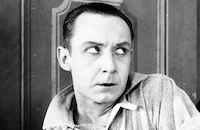Holy Matrimony

Brief Synopsis
Cast & Crew
John M. Stahl
Monty Woolley
Gracie Fields
Laird Cregar
Una O'connor
Alan Mowbray
Film Details
Technical Specs

Synopsis
In 1905, famed English painter Priam Farll, who abhors society and has lived as a recluse in the British East Indies for twenty-five years, receives a summons to return to England to receive a knighthood. Grumbling all the way, Priam travels to England accompanied by his devoted valet, Henry Leek. Henry falls ill during the journey, and Priam sends for a doctor upon their arrival. Henry dies from pneumonia, and Priam, eager to avoid the knighthood ceremony, does not correct the doctor when he assumes that Henry was Priam, and that Priam is the valet. The doctor puts Priam's name on the death certificate, and soon Priam watches as his cousin, Duncan Farll, leads the mourners at his memorial service. Priam's bemusement turns to chagrin, however, when King Edward VII appears and announces that the artist will be buried at Westminster Abbey. Angry at having cheated himself out of this honor, Priam attends the funeral and creates such a ruckus that he is thrown out of the abbey. As two policemen are questioning him outside, Priam is rescued by assertive Alice Challice, who tells them that he is Henry Leek. Priam is amazed that Alice knows about Henry and learns that Henry had been corresponding with her after obtaining her address from a matrimonial bureau and had sent her a picture of himself with Priam. Although aware that Alice has mistaken him for Henry, Priam again does not identify himself. Soothed by Alice's stability and devotion, Priam soon marries her, and the couple settle down to quiet domestic happiness in Putney. Priam continues to paint, although he keeps his art supplies hidden to avoid arousing Alice's suspicions. Priam and Alice's contentment is disturbed by the sudden appearance of Sarah Leek and her three grown sons, John, Matthew and Harry. Sarah claims to be Henry's first wife, whom he deserted many years before, but Alice gets rid of her by insinuating that Priam is insane, and that the scandal that would result from Sarah's allegations would ruin the boys's seminary careers. Later, trouble again presents itself when the couple are short of money and Alice cannot meet that year's mortgage payment. Wanting to help, Priam finally confesses his real identity to Alice and shows her his paintings, which he says can be sold for large sums. Alice, however, thinks that the strain of worry has "confused" Priam and gently dissuades him from persisting with his assertions. When she learns that a picture framer will pay £15 for Priam's paintings, however, she sells them without Priam's knowledge. Their life resumes its quiet pace until a year later, when Lady Vale, who has been buying Priam's latest paintings from a prestigious art gallery run by Clive Oxford, discovers that they could only have been painted since Priam's supposed death. She brings a suit against Oxford, alleging that he fraudulently sold the paintings as authentic Priam Farlls. Oxford, who has met Priam and gotten him to confess the truth, wants Priam to testify on his behalf, but Priam is angered by the situtation, as Oxford has been making a huge profit on the paintings. Alice, who now believes her husband, fears that the attention will destroy their marriage, and Priam determines not to help either Lady Vale or Oxford with his testimony. When Sarah appears in court and states that Priam is her husband, however, Alice asserts herself once again. Alice forces Priam to show two moles on his collarbone, thereby proving that he is Priam Farll and not Henry Leek. After the case is settled, Priam and Alice move to a remote jungle, where they recreate their Putney home and return to their ordinary, happy domestic life.

Director

John M. Stahl
Cast

Monty Woolley

Gracie Fields

Laird Cregar

Una O'connor

Alan Mowbray

Melville Cooper

Franklin Pangborn
Ethel Griffies

Eric Blore

George Zucco

Fritz Feld

Montagu Love
Richard Fraser
Edwin Maxwell

Whitner Bissell
Geoffrey Steele
Leyland Hodgson
William Austin
Lumsden Hare
Thomas Louden

Ian Wolfe
Milton Parsons
Alec Craig
Yorke Sherwood

Billy Bevan
Leslie Denison
Colin Hunter
Charles Knight
Barbara Denny
Arthur Gould-porter
Eric Wilton
John Rogers
Gabriel Canzona
Tom Stevenson

Charles Irwin
Edward Cooper
Keith Hitchcock
Mary Field
David Thursby
Bob Stephenson
Frank Hagney
Helena Grant
Dorothy Lloyd
Guy Kingsford
Matthew Boulton
Olaf Hytten
Emerson Fisher-smith
Colin Campbell
Tudor Williams
Bobbie Hale
Marten Lamont
Jimmy Aubrey
Charles Hall
Cyril Delevanti
Denis Green
Crew
Lucien Ballard
James Basevi
Harry Brand
James B. Clark
William Eckhardt
Paul S. Fox
William Goetz
Roger Heman
Renè Hubert
Nunnally Johnson
Nunnally Johnson
Nunnally Johnson
Thomas Little
Cyril J. Mockridge
Emil Newman
Guy Pearce
Irving Pichel
Fred Sersen
Russell Spencer
E. Clayton Ward

Film Details
Technical Specs

Award Nominations
Best Writing, Screenplay
Articles
Holy Matrimony
Holy Matrimony (1943) had a cast made up of some of the greatest supporting actors in the Golden Age of Hollywood: Monty Woolley, Una O'Connor, Laird Cregar, Alan Mowbray, Melville Cooper, Franklin Pangborn, Eric Blore, and George Zucco. It also starred one of England's most beloved comediennes, Gracie Fields.
The film was based on Arnold Bennett's novel, Buried Alive, which he would later adapt for the stage as The Great Adventure (1911). Holy Matrimony was not the first filmed version of Bennett's work. It had been made as a silent film in England as The Great Adventure (1915) and a remake with the same title in 1921, starring Lionel Barrymore and his then wife, Doris Rankin. Paramount released their own version called His Double Life in 1933 with Roland Young and Lillian Gish.
Holy Matrimony, which had both Buried Alive and Indian Summer as working titles, was adapted for the screen by Nunnally Johnson, who received an Academy Award nomination. Johnson also served as both producer and, according to The Hollywood Reporter, substitute director (with Irving Pichel) when John Stahl fell ill during production.
Monty Woolley had just become a sensation in the film adaptation of his breakthrough Broadway role of The Man Who Came to Dinner (1942) and had been signed to a long contract with Twentieth Century-Fox. Gracie Fields had left England for Hollywood in 1940 because her husband, Italian-born former silent movie comic Monty Banks, would have been interned in the UK for being an "enemy alien". Despite her enormous popularity in England, Fields never enjoyed film acting, considering it only a job that allowed her to have a beautiful home in Capri, Italy.
Released on August 23, 1943, Holy Matrimony was named one of the ten best films of the year by the National Board of Review and received a warm reception by Bosley Crowther of the The New York Times, who wrote, "Mr. Johnson has made a charming picture which is full of sly humor. And John Stahl has directed it with understanding of its smooth wit and satire. They have manfully resisted the temptation to play it for loose-jointed farce and have kept the whole thing within the confines of literate comedy. [...] For much of the picture's velvet quality, they--and we--can thank Mr. Woolley and Miss Fields. Mr. Woolley gives a beautiful representation of a lion with a silver mane roaring at his vexing tormentors and purring in domestic serenity. And Miss Fields, in the gentlest, quietest manner, constructs completely a tender, hardheaded housewife. Laird Cregar is likewise excellent as a tyrannical art dealer, and Una O'Connor, Alan Mowbray and Franklin Pangborn are archly amusing in other roles."
Fields and Woolley proved such a popular team that they were matched again in Molly and Me (1945). The story was resurrected once more in 1954 as a Lux Radio Theater production starring Charles Laughton and Fay Bainter.
Producer: Nunnally Johnson
Director: John M. Stahl
Screenplay: Nunnally Johnson (writer); Arnold Bennett (play)
Cinematography: Lucien Ballard
Art Direction: James Basevi, Russell Spencer
Music: Cyril J. Mockridge
Film Editing: James B. Clark
Cast: Monty Woolley (Priam Farrell), Gracie Fields (Alice Chalice), Laird Cregar (Clive Oxford), Una O'Connor (Sarah Leek), Alan Mowbray (Mr. Pennington), Melville Cooper (Dr. Caswell), Franklin Pangborn (Duncan Farll), Ethel Griffies (Lady Vale), Eric Blore (Henry Leek), George Zucco (Mr. Crepitude).
BW-87m.
by Lorraine LoBianco
SOURCES:
Crowther, Bosley "Holy Matrimony: Delightful Union of Monty Woolley and Gracie Fields in 'Holy Matrimony' at Roxy" The New York Times 16 Sep 43
The Internet Movie Database
MacNab, Geoffrey Searching for Stars: Stardom and Screen Acting in British Cinema
http://www.tcm.com/tcmdb/title/78233/Holy-Matrimony/notes.html

Holy Matrimony
Quotes
Trivia
Notes
The working titles of this film were Buried Alive and Indian Summer. Arnold Bennett used his book as the basis for a play entitled The Great Adventure (Glasgow, Scotland, 18 September 1911). Nunnally Johnson's onscreen credit reads "Produced and Written for the Screen by Nunnally Johnson." According to Hollywood Reporter news items, Johnson and Irving Pichel both served as fill-in directors while John Stahl was ill. Although a Hollywood Reporter news item stated that, "in response to an avalanche of fanmail from this country and England," Gracie Fields would sing "She Was Only a Bird in a Gilded Cage" and "The Biggest Aspidistra in the World" in the film, the numbers were not included in the picture. Holy Matrimony marked Fields's first leading role in a picture filmed in the United States. Actor Whit Bissell, who is listed as Whitner Bissell in reviews, made his screen-acting debut in the picture, which also marked the last screen appearance of actor Montagu Love, who died shortly after completing his work in the film. The picture was selected as one of the ten best films of 1943 by the National Board of Review. Johnson's screenplay received an Academy Award nomination.
Bennett's novel and play were also the basis for a 1915 British film entitled The Great Adventure, directed by Larry Trimble and starring Henry Ainley and Esme Hubbard; the 1921 Whitman Bennett film The Great Adventure, directed by Kenneth Webb and starring Lionel Barrymore and Doris Rankin (see AFI Catalog of Feature Films, 1921-20; F2.2216); and the 1934 Eddie Dowling Pictures production His Double Life, directed by Arthur Hopkins and starring Roland Young and Lillian Gish (see AFI Catalog of Feature Film, 1931-40; F3.1924). In the 1934 version, Montagu Love played "Priam's" cousin "Duncan." On May 10, 1954, Lux Radio Theatre broadcast a version of the story starring Charles Laughton and Fay Bainter.















